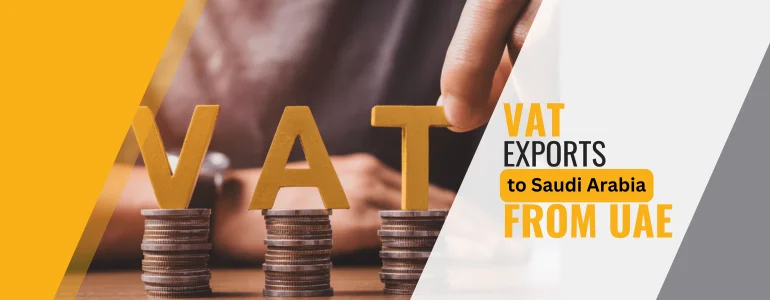Navigating the complexities of VAT on exports to Saudi Arabia from UAE can be challenging for businesses looking to expand. With intricate rules and potential penalties, understanding UAE to Saudi Arabia VAT regulations is crucial for seamless and profitable international trade. In this blog, we dive into these complexities, offering the insights you need on VAT on exports to Saudi Arabia from UAE.

What is Value Added Tax (VAT)?
Value Added Tax (VAT) is a type of consumption tax widely used worldwide. Over 150 countries, including all 29 European Union (EU) members, Canada, New Zealand, Australia, Singapore, and Malaysia, have implemented VAT or its equivalent, Goods and Services Tax (GST). The UAE introduced VAT on January 1, 2018, at a standard rate of 5%.
VAT in Global Trade
VAT on exports to Saudi Arabia from UAE plays a significant role in international trade. The tax becomes due when goods are imported into a member state, subject to specific conditions. A standard VAT rate of 5% is applied to the value of imports unless exemptions or zero-rates apply.
Zero-Rated Sectors and Exemptions
Certain sectors may be exempt or subject to zero-rate VAT, including the education, health, real estate, and local transport sectors. Each member state, including the UAE, can set its own conditions for vat exemptions or zero-rates, impacting VAT on exports to Saudi Arabia from UAE.
VAT Regulations for UAE Exports
As per Article 45 of the Federal Decree-Law No. 8 of 2017 on Value Added Tax, any direct or indirect export of goods from the UAE or other GCC implementing states to outside the states will be treated as zero-rated if it meets specific conditions. Understanding these rules is vital for businesses involved in VAT on exports to Saudi Arabia from UAE.
Direct Export Rules
Direct exports occur when goods are sent to a location outside the UAE, with the supplier arranging transport. To qualify for the zero rate, goods must be exported within 90 days, with official evidence retained. This is a key aspect of VAT on exports to Saudi Arabia from UAE.
Indirect Export Explained
Indirect exports involve the overseas customer arranging collection and export of goods from the UAE. To benefit from zero-rate VAT, goods must be exported within 90 days, with proper documentation. This is crucial for businesses handling VAT on exports to Saudi Arabia from UAE.
Essential Documents for Exports
To comply with VAT on exports to Saudi Arabia from UAE, businesses must provide official and commercial evidence of export. This includes:
- Official Evidence: Export documents from the local customs department.
- Commercial Evidence: Documents like airway bills, bills of lading, and shipment certificates.
Failure to provide necessary documents can result in a 5% VAT charge, affecting the overall cost of VAT on exports to Saudi Arabia from UAE.
VAT on Exports from UAE to Saudi Arabia
Saudi Arabia and the UAE have implemented VAT in the GCC region. Understanding VAT applicability on exports is essential for businesses engaged in VAT on exports to Saudi Arabia from UAE. Here’s a quick guide:
- Registered under KSA VAT: Zero-rate
- Unregistered and below threshold: 5% VAT
- Unregistered and above threshold: 15% VAT (KSA registration required)
Saudi Arabia Import VAT from UAE
When importing goods into Saudi Arabia, VAT is applied under specific conditions. Zero-rated VAT may apply if goods are exempt in the final destination. Understanding these nuances is critical for managing VAT on exports to Saudi Arabia from UAE.
Key Exemptions
Goods like medicines and medical equipment can be zero-rated, along with other exempt categories such as diplomatic exemptions and personal luggage for first-time residents. Familiarity with these exemptions can simplify handling VAT on exports to Saudi Arabia from UAE.
Conclusion
Navigating VAT on exports to Saudi Arabia from UAE requires businesses to stay informed and seek professional advice. Our experts at Bestax are here to help you comply with regulations and optimize your export processes. Reach out to us today for guidance on VAT on exports to Saudi Arabia from UAE.
FAQs on VAT on Exports to Saudi Arabia from UAE
1. What is the VAT rate on exports to Saudi Arabia from UAE?
For exports to Saudi Arabia from the UAE, the VAT rate can vary. If the recipient is registered under Saudi Arabia’s VAT, the transaction is zero-rated. If the recipient is unregistered and the annual export value is below the Saudi VAT registration threshold, a 5% VAT applies. However, if the export value exceeds the threshold, a 15% VAT is applicable, and the recipient must register for Saudi VAT.
2. How do I comply with VAT regulations for exports to Saudi Arabia?
To comply with VAT on exports to Saudi Arabia from UAE, ensure that you understand and adhere to the zero-rate and standard rate conditions. Maintain accurate records, such as commercial invoices and export documents. Consulting with VAT experts, like Bestax Consultants, can help you stay compliant and avoid penalties.
3. Are there any exemptions for VAT on exports to Saudi Arabia from UAE?
Yes, some goods and sectors may be exempt from VAT or subject to a zero rate. For instance, goods used in the health sector or exported under specific conditions may be zero-rated. It’s important to understand these exemptions to manage VAT on exports to Saudi Arabia from UAE effectively.
4. What documents are needed for VAT on exports to Saudi Arabia?
For VAT compliance, you need to provide both official and commercial evidence of exports. This includes export documents issued by customs, commercial invoices, airway bills, bills of lading, consignment notes, and shipment certificates. Proper documentation is crucial to benefit from the zero rate on VAT on exports to Saudi Arabia from UAE.
5. How do I report VAT on exports to Saudi Arabia in UAE?
When reporting VAT on exports to Saudi Arabia from UAE, ensure that all transactions are accurately recorded in your VAT returns. Include details of zero-rated exports and any standard-rated supplies. Use the official FTA portal for VAT filing and consider seeking professional advice to ensure accuracy.
6. Can I claim a VAT refund for exports to Saudi Arabia from UAE?
Yes, if you are a UAE business making zero-rated exports to Saudi Arabia, you may be eligible to claim a VAT refund on related input costs. Ensure that you have proper documentation and follow the UAE VAT refund process for exports to Saudi Arabia.
7. What are the penalties for non-compliance with VAT on exports to Saudi Arabia?
Non-compliance with VAT regulations can result in penalties, including fines and interest charges. Failure to maintain proper records or incorrectly applying VAT rates can lead to substantial penalties. To avoid this, ensure that your business stays informed and compliant with VAT on exports to Saudi Arabia from UAE.
8. How does VAT on exports to Saudi Arabia affect pricing?
VAT on exports to Saudi Arabia from UAE can impact pricing, especially if standard rates apply. Businesses need to factor in VAT costs when setting export prices. Zero-rated exports might have less impact, but it’s essential to consider VAT in overall pricing strategies.
9. What is the process for paying VAT on exports to Saudi Arabia?
For paying VAT on exports to Saudi Arabia, ensure you follow the correct procedures for collecting and remitting VAT. Use the official tax portals of the UAE and Saudi Arabia to make payments, and keep detailed records of all transactions. Consulting with a VAT expert can help streamline the payment process.
10. Are there any recent updates on VAT regulations for exports to Saudi Arabia from UAE?
VAT regulations are subject to change, so staying informed about recent updates is essential. Regularly check for updates from the UAE Federal Tax Authority and Saudi Arabian General Authority of Zakat and Tax. Engaging with professional consultants can also help you navigate changes in VAT on exports to Saudi Arabia from UAE.
Disclaimer: The information provided in this blog is for general informational purposes only. For professional assistance and advice, please contact experts.





